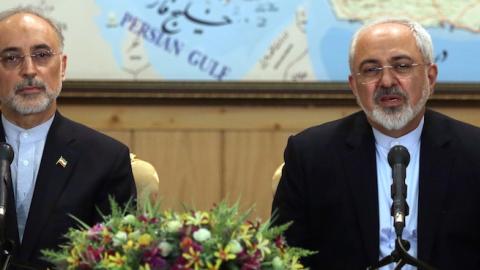Americans have debated whether the Joint Comprehensive Plan of Action (JCPOA) gives inspectors sufficient visibility into suspected, undisclosed Iranian activities, and whether, in the event of Iranian breach, sanctions will snapback. But there’s a bigger problem: the Joint Plan grants Iran and friends grounds to exclude from snapback sanctions long-term sales of Iranian oil and gas, or virtually any non-nuclear items that Iran wishes.
It’s a hole in the agreement through which Iran and its future business partners will shove twenty years of, for example, oil tankers. Future U.S. presidents will lose any meaningful economic leverage.
JCPOA Paragraph 37 governs snapback sanctions, which are the only means under the plan, for enforcing it. Paragraph 37 excludes snapping back old UN sanctions “with retroactive effect to contracts signed between any party and Iran or any Iranian individuals and entities prior to” sanctions being re-imposed.
So, once the JCPOA is in place and sanctions lifted, Iran or any Iranian entity could launch long-term (say 20 year) contracts to sell to “any party”— including Chinese, Russian, Lebanese or other parties friendly to Iran—all the oil or gas, for example, that Iran chooses in the future to sell. This would be similar to “output contracts” used in the commercial world. Similarly, Iran could sign long term contracts to buy or sell other non-nuclear items, as well as to cover additional, otherwise impermissible arrangements.
Yes, sanctions snap back in this scenario, but around a huge, multi-million dollar hole.
Not surprisingly, Iran has already leapt at this loophole. On July 23, just nine days after announcing the JCPOA, Iran’s Minister of Industry, Mines, and Trade, Mohammad Nematzsadeh, announced preparation of a new “model contract,” initially designed for Iranian oil and gas industries, but which might later apply to other industries as well. How long would these contracts run? Twenty to twenty-five years.
Long term contracts to sell oil usually run only a couple of years, as expert Lucian Pugliarisi of energy consulting firm EPRINC notes. But to avoid sanctions, Iran and its partners will sign much longer-term sales contracts, or tie them to investments, service or expertise transfers, common to longer-term arrangements. Either way, Iran will argue that the future business it has locked in is also locked out of any sanctions regime.
Nor will Iran be the only advocate, as Iranian Foreign Minister Javad Zarif recently stressed. Companies and countries that benefit from such long-term contracts may stand beside it. Some will likely be JCPOA parties, including China and Russia, but allies Germany and France, and indeed, other countries, too, are sending business missions to Tehran.
There is only one limit on the JCPOA’s exemption of long-term contracts. The JCPOA requires that “the activities contemplated under and execution of such contracts are consistent with this JCPOA and the previous and current UN Security Council Resolutions.”
So Iran could not contract for nuclear weapons parts, for example, improper even under the JCPOA. But Iran and its business partners will argue, with reason, that any contract entered into during the JCPOA whose activities and signing were then permissible under the Joint Plan and resolutions (when the activities were “contemplated” and the agreement “executed” or signed) would be “grandfathered” in and cannot subsequently be barred, even though such contracts would otherwise fall under renewed sanctions.
Iran and its partners would have good grounds to maintain their position. Generally, provisions will not be interpreted to be meaningless. So paragraph 37 cannot mean that the exemption from snapback sanctions is limited to items not covered by snapback sanctions, because that would be a meaningless exemption.
With UN sanctions in interpretive knots, America’s only meaningful tool would be unilateral sanctions, including those affecting the U.S.’s—and hence much of the world’s—financial system. But would we really sanction Chinese or Russian (or French) entities for buying oil that left Iran under long-term contracts the JCPOA apparently exempted from UN sanctions?
And would we do so? Secretary of the Treasury Jacob Lew recently testified that imposing unilateral financial sanctions even on clearly illegal sales would lead to the collapse of the global economic order. Correct or not—and there are reasons for thinking not—Lew’s import is clear: once lifted, sanctions will be effectively over. The JCPOA would be unenforceable in practical terms.
Consider how remarkable all this is. Assume the Iranians are caught trying to build nuclear warheads for missiles. Why should any kind of contract be guaranteed to continue? But the JCPOA may be said to allow just that.
So, as the JCPOA commences, Iran will have roughly $100 billion transferred into its coffers; sanctions free, it will earn more; and it will have long-term contracts worth multi-millions in years to come, even if it breaches the JCPOA. With such assets, no economic coercion will remain viable.
True, America could seek new, harsher UN sanctions. But avoiding Russian or Chinese Security Council vetoes are what the snapback was supposed to avoid.
Perhaps this is why several Iranian officials have declared confidently that, once removed, sanctions will never be re-imposed. Iranian Foreign Minister Javad Zarif described the American problem: “Our snap-back is easier than theirs, because we can resume our work with nuts and bolts, but they [will need] to convince countries to resume sanctions.” He added, quite reasonably under the agreement, that “doing business with foreigners is a guarantee to make them unable to use snap-back mechanism.” Translation: Iran might have nuclear weapons in months; sanctions would not bite for years.
The Obama administration claims the JCPOA guarantees access to suspected Iranian nuclear sites within 24 days. As previously noted, such claims are fanciful. How appropriate, then, that meaningful post-breach sanctions are fanciful, too.
















